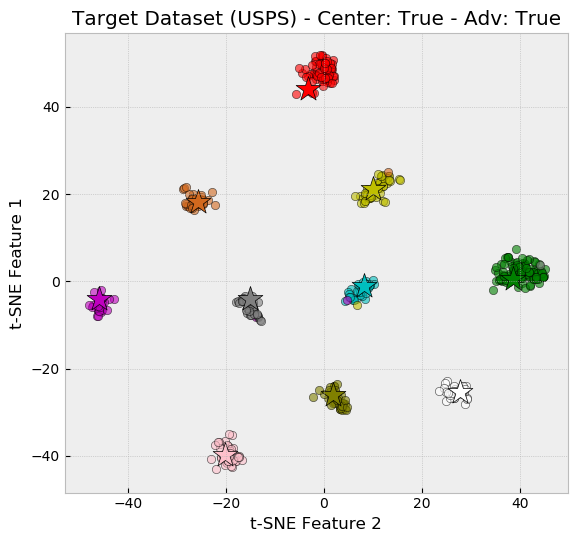M-ADDA: Metric-based Adversarial Discriminative Domain Adaptation [Paper]
Accepted in the ICML 2018 Workshop of Domain Adaptation for Visual Understanding (DAVU).
The idea is to cluster the source dataset using the triplet loss and then cluster the target dataset using adversarial learning and the center-magnet loss. The Figure below shows the resultant clusters after using this method. The different colored stars represent the cluster centers, each corresponding to a different digit category.
| Source (MNIST) | Target (USPS) |
|---|---|
 |
 |
- pytorch 0.4.0.
- torchvision 0.2.0
cd datasets
bash download.sh
To obtain the test results, do the following two steps:
cd checkpoints
bash download.sh
python main.py -e usps2mnist mnist2usps uspsBig2mnistBig mnistBig2uspsBig -m test_model
The output should be,
mnist2usps 0.955676
mnistBig2uspsBig 0.980541
usps2mnist 0.951500
uspsBig2mnistBig 0.983100
which represent the accuracies obtained on the target test set.
- mnistBig, and uspsBig use the full training set.
- mnist, and usps use 2000 images from MNIST and 1800 images from USPS for training, respectively.
cd checkpoints
bash download.sh
cd ..
cd datasets
bash download.sh
cd ..
python main.py -e usps2mnist -m train -rt 1
python main.py -e mnist2usps -m train -rt 1
python main.py -e mnistBig2uspsBig -m train -rt 1
python main.py -e uspsBig2mnistBig -m train -rt 1
If you find this useful for your research, please cite:
@Article{laradji2018m,
title={M-ADDA: Unsupervised Domain Adaptation with Deep Metric Learning},
author={Laradji, Issam and Babanezhad, Reza},
journal={arXiv preprint arXiv:1807.02552},
year = {2018}
}